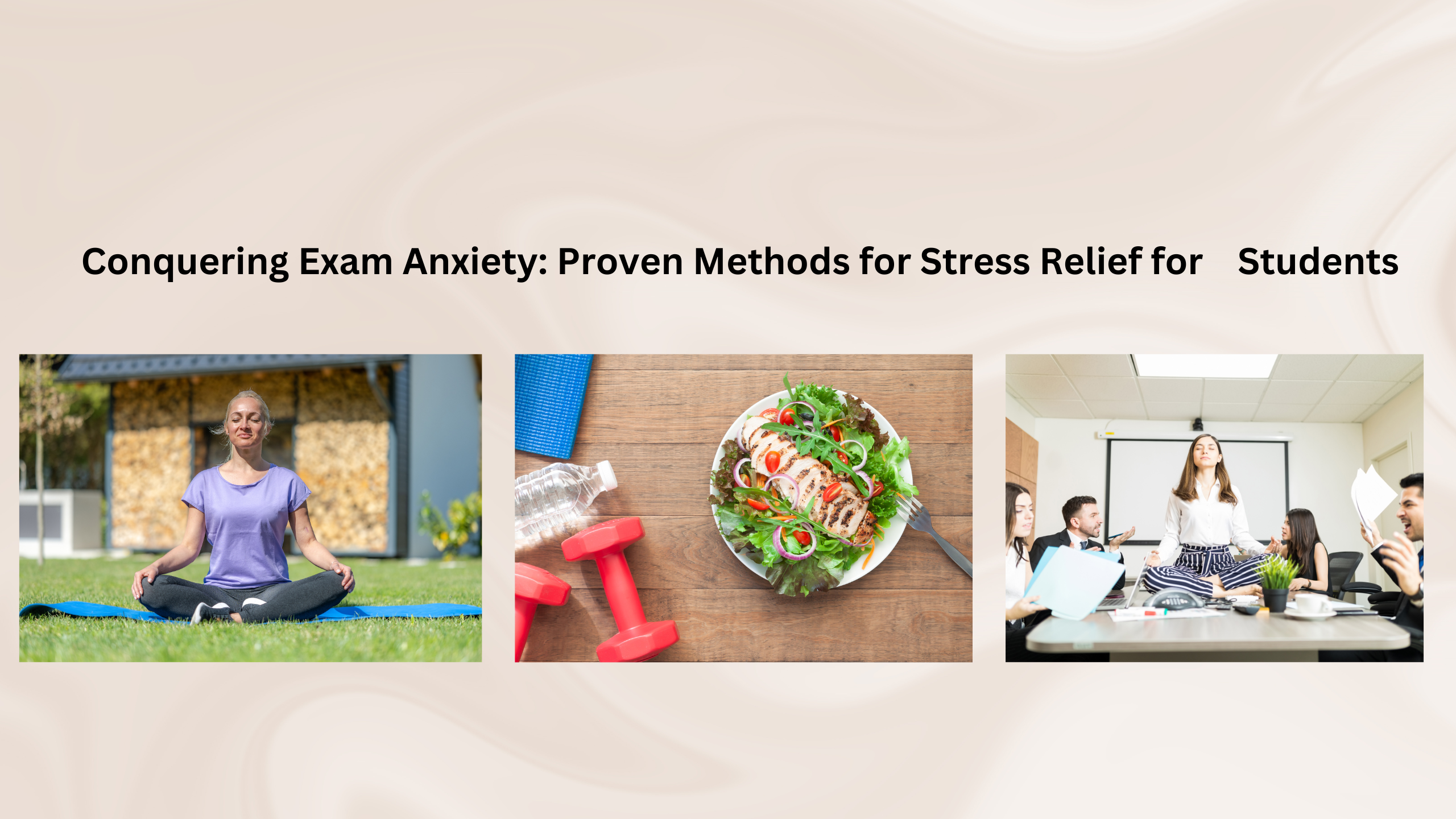How do students deal with stress and anxiety during exam periods?
Introduction
Stress and anxiety are common experiences for students during exam periods. The pressure to perform well, coupled with tight schedules and high expectations, can create overwhelming feelings. In this blog post, we will explore how students deal with stress and anxiety during exam periods, providing practical tips, strategies, and insights to help manage these challenges effectively. Whether you’re a student yourself or someone supporting one, this guide will offer valuable information to make exam season more manageable.
Introduction
Stress and anxiety are common experiences for students during exam periods. The pressure to perform well, coupled with tight schedules and high expectations, can create overwhelming feelings. In this blog post, we will explore how students deal with stress and anxiety during exam periods, providing practical tips, strategies, and insights to help manage these challenges effectively. Whether you’re a student yourself or someone supporting one, this guide will offer valuable information to make exam season more manageable.
The Impact of Stress and Anxiety During Exam Periods
What Causes Exam Stress?
Exam stress is often triggered by the fear of failure, time pressure, and the weight of expectations from oneself, peers, or family. The lack of preparation, uncertainty about the exam content, and the high stakes involved also contribute to these feelings.
The Effects of Stress and Anxiety on Students
When stress and anxiety are not managed, they can lead to physical symptoms such as headaches, fatigue, and sleep disturbances. Mentally, students may experience difficulty concentrating, memory lapses, and feelings of hopelessness, which can further impact their academic performance.
Advantages and Disadvantages of Stress Management Techniques
Advantages
- Improved Focus and Concentration: Effective stress management techniques can enhance focus, allowing students to study more efficiently.
- Better Mental Health: Reducing stress and anxiety can lead to better overall mental well-being, preventing burnout and other long-term health issues.
- Increased Academic Performance: Students who manage their stress well are more likely to perform better in exams as they approach them with a calm and focused mindset.
Disadvantages
- Time Investment: Some stress management techniques require time to practice and master, which can feel like an additional burden during exam periods.
- Temporary Relief: Certain methods may only provide short-term relief, requiring continuous effort to maintain their effectiveness.
- Not One-Size-Fits-All: What works for one student might not work for another, necessitating a personalized approach that may take time to discover.
Problems and Concerns
Over-Reliance on Quick Fixes
Students may turn to quick fixes like caffeine, energy drinks, or even unhealthy habits to manage stress, which can lead to more significant issues in the long run. While these might offer temporary relief, they often exacerbate anxiety and lead to physical and mental health problems.
Lack of Support Systems
Not all students have access to supportive environments where they can talk about their stress and anxiety. This isolation can make managing these feelings more challenging, leading to a decline in mental health.
Perfectionism and Unrealistic Expectations
Students often set unrealistic expectations for themselves, driven by perfectionism. This mindset can amplify stress and anxiety, making it difficult to perform well and enjoy the learning process.
Dos and Don’ts of Managing Exam Stress
Dos:
- Practice Regular Study Habits: Establishing a consistent study routine can reduce last-minute cramming and the stress that comes with it.
- Take Breaks: Short, regular breaks during study sessions can help refresh the mind and prevent burnout.
- Stay Physically Active: Exercise is a proven stress reliever. Even a short walk can help reduce anxiety and improve mood.
- Eat Well: A balanced diet can positively affect mood and energy levels, helping to keep stress in check.
- Sleep Well: Adequate sleep is crucial for memory consolidation and overall mental health.
Don’ts:
- Avoid Cramming: Cramming can increase anxiety and is often less effective than regular, spaced-out study sessions.
- Don’t Neglect Your Health: Skipping meals, sacrificing sleep, or neglecting physical activity can exacerbate stress.
- Avoid Isolation: Don’t withdraw from friends and family. Social support is important for managing stress.
- Don’t Compare Yourself to Others: Every student has a unique learning style and pace. Comparing yourself to others can increase unnecessary stress.
Case Study: Managing Stress Through Mindfulness
Consider the case of Sarah, a university student who struggled with overwhelming anxiety during exam periods. Initially, Sarah relied on late-night cramming and excessive caffeine to manage her stress, leading to poor sleep and increased anxiety. After seeking help from a campus counselor, she was introduced to mindfulness practices, including deep breathing exercises and guided meditation.
By incorporating mindfulness into her daily routine, Sarah learned to stay present, reduce negative thoughts, and approach her exams with a calmer, more focused mindset. Over time, she noticed a significant improvement in her academic performance and overall well-being.
FAQs
- What are some effective ways to reduce exam anxiety?
- Techniques like mindfulness, regular exercise, proper nutrition, and adequate sleep are effective in reducing exam anxiety.
- Is it normal to feel stressed before exams?
- Yes, it is normal to feel some level of stress before exams. It can be a motivating factor, but it’s important to manage it effectively.
- How can I improve my concentration during study sessions?
- Break your study sessions into smaller, manageable chunks, take regular breaks, and minimize distractions to improve concentration.
- What should I do if I feel overwhelmed during an exam?
- Take a few deep breaths, refocus your mind, and remind yourself of the preparation you’ve done. It can also help to take a short mental break before continuing.
- Are there any resources available for students dealing with severe anxiety?
- Many universities offer counseling services, and there are also online resources and hotlines available to help students manage severe anxiety.
My Advice
If you’re a student dealing with stress and anxiety during exam periods, remember that it’s okay to ask for help. Utilize campus resources, talk to friends and family, and take proactive steps to manage your stress. Find what works best for you, whether it’s regular exercise, mindfulness practices, or simply maintaining a healthy routine. Remember, exams are important, but your mental and physical well-being should always come first.
Conclusion
Exam periods are undoubtedly stressful, but with the right strategies and mindset, students can manage their stress and anxiety effectively. By understanding the causes, employing practical techniques, and knowing when to seek help, you can approach your exams with confidence and composure. Remember to take care of yourself, stay organized, and prioritize your well-being above all else.
Image Creation Ideas: Consider images that depict students engaging in stress-relief activities like meditation, exercise, or studying in a calm environment. Illustrations showing the contrast between stressed and calm students might also be effective.
H1: How Do Students Deal with Stress and Anxiety During Exam Periods?
Meta Description: Learn how students can effectively manage stress and anxiety during exam periods with practical tips, strategies, and advice to stay calm and focused.
Problems and Concerns
Over-Reliance on Quick Fixes
Students may turn to quick fixes like caffeine, energy drinks, or even unhealthy habits to manage stress, which can lead to more significant issues in the long run. While these might offer temporary relief, they often exacerbate anxiety and lead to physical and mental health problems.
Lack of Support Systems
Not all students have access to supportive environments where they can talk about their stress and anxiety. This isolation can make managing these feelings more challenging, leading to a decline in mental health.
Perfectionism and Unrealistic Expectations
Students often set unrealistic expectations for themselves, driven by perfectionism. This mindset can amplify stress and anxiety, making it difficult to perform well and enjoy the learning process.
Dos and Don’ts of Managing Exam Stress
Dos:
- Practice Regular Study Habits: Establishing a consistent study routine can reduce last-minute cramming and the stress that comes with it.
- Take Breaks: Short, regular breaks during study sessions can help refresh the mind and prevent burnout.
- Stay Physically Active: Exercise is a proven stress reliever. Even a short walk can help reduce anxiety and improve mood.
- Eat Well: A balanced diet can positively affect mood and energy levels, helping to keep stress in check.
- Sleep Well: Adequate sleep is crucial for memory consolidation and overall mental health.
Don’ts:
- Avoid Cramming: Cramming can increase anxiety and is often less effective than regular, spaced-out study sessions.
- Don’t Neglect Your Health: Skipping meals, sacrificing sleep, or neglecting physical activity can exacerbate stress.
- Avoid Isolation: Don’t withdraw from friends and family. Social support is important for managing stress.
- Don’t Compare Yourself to Others: Every student has a unique learning style and pace. Comparing yourself to others can increase unnecessary stress.
Case Study: Managing Stress Through Mindfulness
Consider the case of Sarah, a university student who struggled with overwhelming anxiety during exam periods. Initially, Sarah relied on late-night cramming and excessive caffeine to manage her stress, leading to poor sleep and increased anxiety. After seeking help from a campus counselor, she was introduced to mindfulness practices, including deep breathing exercises and guided meditation.
By incorporating mindfulness into her daily routine, Sarah learned to stay present, reduce negative thoughts, and approach her exams with a calmer, more focused mindset. Over time, she noticed a significant improvement in her academic performance and overall well-being.
FAQs
- What are some effective ways to reduce exam anxiety?
- Techniques like mindfulness, regular exercise, proper nutrition, and adequate sleep are effective in reducing exam anxiety.
- Is it normal to feel stressed before exams?
- Yes, it is normal to feel some level of stress before exams. It can be a motivating factor, but it’s important to manage it effectively.
- How can I improve my concentration during study sessions?
- Break your study sessions into smaller, manageable chunks, take regular breaks, and minimize distractions to improve concentration.
- What should I do if I feel overwhelmed during an exam?
- Take a few deep breaths, refocus your mind, and remind yourself of the preparation you’ve done. It can also help to take a short mental break before continuing.
- Are there any resources available for students dealing with severe anxiety?
- Many universities offer counseling services, and there are also online resources and hotlines available to help students manage severe anxiety.
My Advice
If you’re a student dealing with stress and anxiety during exam periods, remember that it’s okay to ask for help. Utilize campus resources, talk to friends and family, and take proactive steps to manage your stress. Find what works best for you, whether it’s regular exercise, mindfulness practices, or simply maintaining a healthy routine. Remember, exams are important, but your mental and physical well-being should always come first.
Conclusion
Exam periods are undoubtedly stressful, but with the right strategies and mindset, students can manage their stress and anxiety effectively. By understanding the causes, employing practical techniques, and knowing when to seek help, you can approach your exams with confidence and composure. Remember to take care of yourself, stay organized, and prioritize your well-being above all else.







